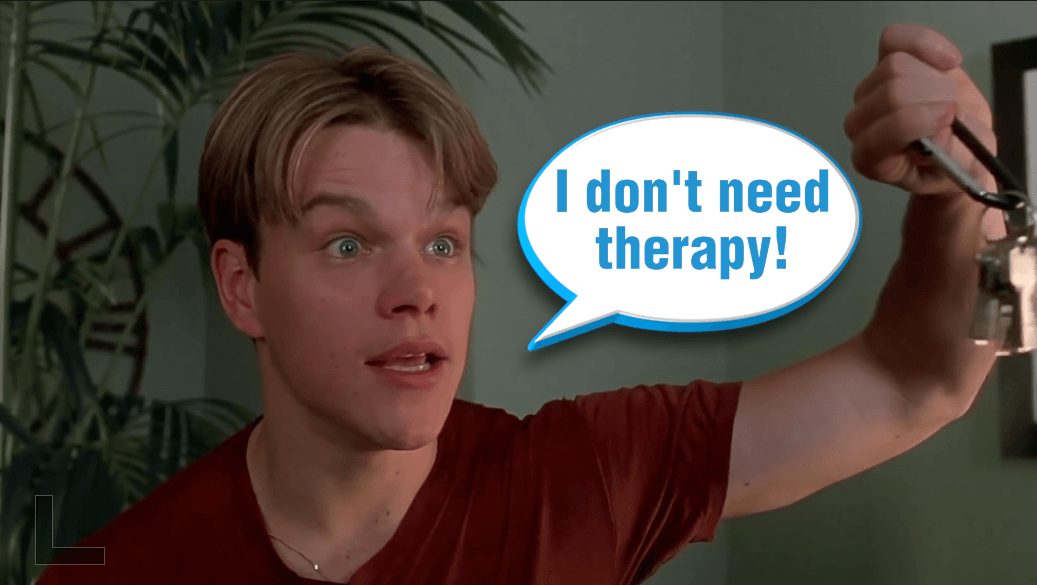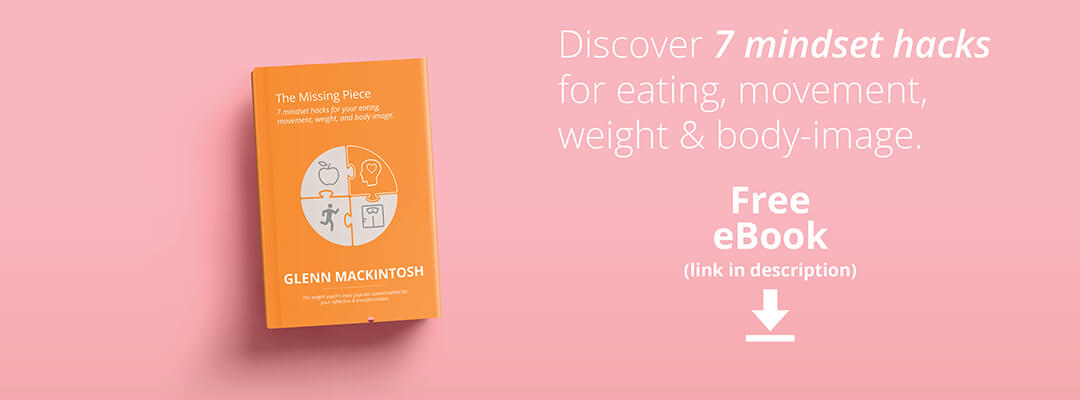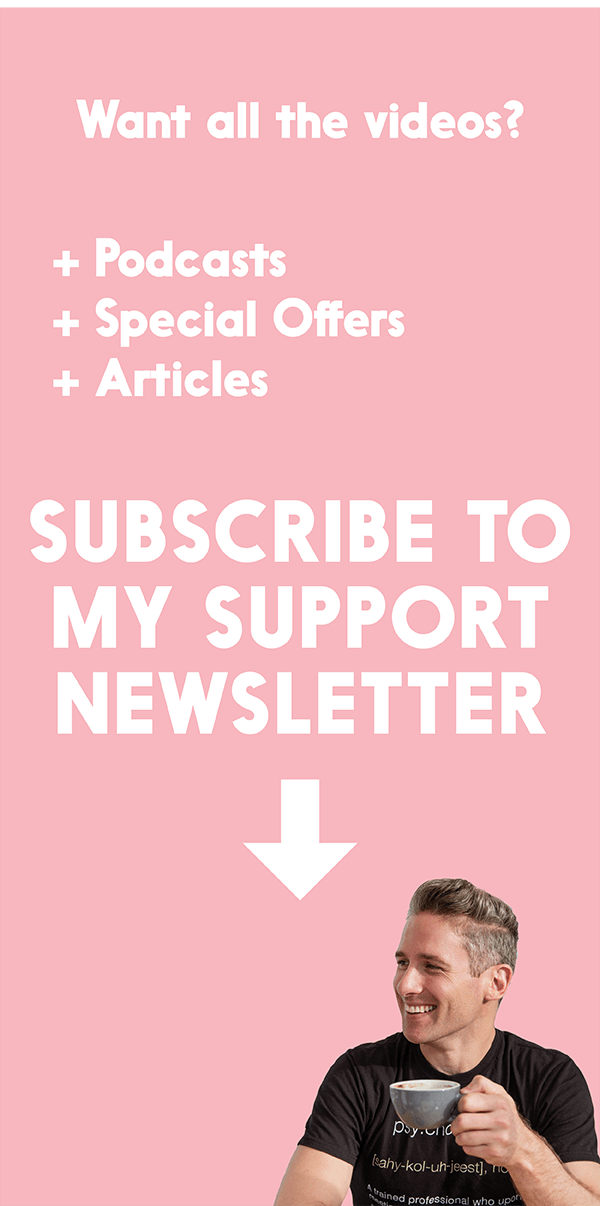
In this Thursday Therapy Glenn shares 7 hacks for getting the most out of working with health professionals, whether they be psychologists or counselors, dietitians or naturopaths, doctors, fitness professionals or anyone else supporting you…they even work for completing online programs, reading books, or doing any other self-development!
Watch Video
I created this video for people just like you.
If you found it valuable, please help me share it with them!
SHOW NOTES
- Finding the right health professional (& developing trust). [6:27]
- Why spending time on the details in your appointments is invaluable. [7:03]
- Dealing with the “tough stuff”. [8:00]
- Changing perspective. [8:36]
- Having faith in your health professionals. [9:02]
- How having a goal helps your appointments. [9:58]
- Glenn’s No. 1 tip for succeeding with your health professional. [10:54]
- Parting thoughts on trying these ideas with your health professional. [12:11]
TRANSCRIPT
Welcome to Thursday Therapy, where I answer your questions on the psychology of eating, movement, weight and body image. Guys, we’ve gotten there. This is the last Thursday Therapy for the year, so thank you for being with us. We always like to do something a little bit different at the last TT, so today I’m going to answer a question that a lot of people ask me, but even if they don’t ask, I know a lot of people want to ask me. Can I really benefit from therapy? I’m going to give you my answer, but also some answers on how to make the most out of your therapy.
Now, of course if you’re thinking of, or you are seeing, a psychologist, or a counsellor, or a psychiatrist, or a life coach, this is going to be really useful. You can also apply these principles to your dietician, your fitness professional, your medical doctor, and even any online programmes, any other self-development, and even how to get the most out of Thursday Therapy.
Before I answer the question, I want to let you know about some cool stuff we’ve got coming up in 2018. Every year we want to get bigger and better with the stuff that we bring you, so we’re going to change things up in 2018, as some exciting things that you asked for are coming into fruition.
The first thing that I’m really excited about is called Secrets of the Success Stories. This is the brainchild of Wendy Burke, who is our personal trainer and a naturopath, and has also lost and maintained a weight loss of over 60 kilograms.
What we’re going to do is we’re going to share with you the real life, warts and all, honest truth of what happens when people lose a significant amount of weight and keep it off. It’s not going to be a celebrity endorsement, or a before and after that’s designed to sell you something. It’s not a weight loss how to. It’s looking into these people’s lives to see if we can learn anything that’s going to help you on your journey.
We’re going to ask these people why they did it. We’re going to ask them how they did it. We’re going to ask them what’s changed. We’re going to ask them what hasn’t changed. We’re going to ask them, what is life really like now? Pros, cons, the good, the bad and the ugly. Then we’re going to ask them of course, why do you think you’ve managed to become one of these very small percentage of people that can lose a significant amount of weight and keep it off?
To help us, we want to know what you would like. If you had the opportunity to talk to these people and ask them anything you wanted, what would you want to know? Also, if you are one of these people, and you live in the Queensland area, because we’re going to do the interviews face to face, then we would love to hear from you too.
The next thing we’re going to do I’m calling On the Couch with the Weight Psych. This is where I’m going to connect you with some of the people that inspire me. From this wonderful dietician who is doing some amazing research on how we create habits, to a scientist who is helping us understand how seeing all of those pictures of thin ideal images actually perceptually distort what we see in the mirror. To a doctor specialising in neuroscience, who can help us understand how we can use our brain to change our bodies. I’m going to connect you with some awesome people who really compliment the work we do, but also extend on it. Look forward to that.
To get all of these new videos in, and make sure that we’re not emailing you every five minutes, we’re going to extend the time between Thursday Therapies from every couple of weeks to every month, and we’re going to put these videos in between. They’re going to be great. They’re exactly what you guys asked for. I’m really excited about them, and I know that you’re going to love them.
Let’s get to answering the question. When people find out what I do, there’s often a lot of interest and people ask, “Hey Glenn, how would you deal with this problem?” Or, “I have a friend who has this problem.” Often the underlying question is, can therapy really work for me? People who work with me for a while will know that I’m all about asking empowering questions, so I’m going to answer that question, “Can it work for me?” With the answer, probably yes. Then I’m going to encourage you to ask a more empowering question, how can therapy work for me? This question, rather than being a yes/no answer, assumes that therapy can work for you, but more importantly it empowers you to look at what you bring to the table to get the most out of it.
Look, I could have 100 of these ideas, but I’m just going to share seven of them with you from my latest sessions with people. I’m sure that they’ll help you, whether you’re thinking about doing therapy, whether you’re kind of in therapy and stuck at a little sticking point that we kind of get, or whether you’re doing really, really well, and you want to just keep doing well.
You need to have trust with your health professional. I think that starts with finding the right person for you, and I think you’ve got to go with your gut there. It also means that you might need to learn to develop trust. I’ve been working with a lady for months now, and it was only a couple of weeks ago that we had developed enough trust for me to say, “Hey you know what? I think we should look into this area.” Her to say, “Yup, okay. Now I’m willing to go there.” Give yourself the time to build trust, and if you have any concerns, bring it up with your health professional. Often you’ll be able to work through it.
If you want to create changes between sessions, and more importantly changes that last, it’s really important to zero in on all the details. Rather than coming up with 50 recommendations, focus on one or two things and make sure you really problem solve all of the little details, so you can get it done. For example, I spent a full session yesterday focusing just on improving someone’s sleep. We looked at making sure that the person was getting a nutritious meal, and how we would prepare for that meal so they weren’t hungry. We looked at reducing screen time, but also how they would remind themselves to reduce the screen time. Then we looked at the support from the family members, and we even got in contact with one of the family members. I feel so much better about how that person will do with their sleep, rather than if get better sleep was one of five recommendations that we had in the session.
Sometimes you just need to go there and deal with the tough stuff, even if it’s unpleasant, or uncomfortable, or really hard. I had a session with someone a couple of weeks ago where she sat down, and she took a deep breath, and she said, “All right Glenn, today let’s deal with the tough stuff.” It was a big session, and there were a few tears, but an hour or two after the session she sent me a message and said, “Glenn, I’m so glad we did that. I feel like a weight’s been lifted off my shoulders already.”
Sometimes if you’re feeling a bit stuck, you might need to switch things up a little bit. I was working with a guy, and we were making good progress, and then we started to hit a little bit of a snag, and he decided to book a holiday. He’s a very hard working man, very routine man, and he just booked this holiday out of the blue. He came back with a whole new perspective, and some awesome stuff for us to work on. sometimes, especially if you struggle with a problem for a long in the past, and you haven’t been able to find your way through, you can’t see the light at the end of the tunnel, so you have to have faith.
I remember having a pretty honest session with someone a couple of weeks ago where they said, “Glenn, I really can’t see it that I can ever change.” I said, “Maybe you’re going to just need to for now have faith that I know what I’m doing, and that even if you can’t see it, I can see the possibility for your change.” The cool thing was, just yesterday she sent me an email to say this really big thing we had been working on, she’d done it once. Now that’s the first step on a journey of 1000 miles, but I suppose that’s what faith is all about. Sometimes you have to start walking up the staircase without knowing where it leads.
If you can’t quite grasp your motivation, sometimes it can be really good to find a goal. Just that little extra oomph. Of course, it’s always good to take great care of yourself. It’s always good to eat well. It’s always good to move well. It’s always good to get good sleep and deal with your stress. Sometimes if you’ve got that thing that’s focusing you, you just have that extra little bit of commitment.
I was working with a guy who had made progress on all fronts. We were doing really well. Then for a couple of months we seemed to hit a bit of a plateau, and he decided then he was going to get a goal to do a series of those obstacle races. It’s really kind of gotten into his head, and its just created an extra energy in our sessions, and those between sessions activities just have that extra bit of commitment, that extra motivation, and that extra energy around them.
The final thing is, and this one is really important, to keep making progress you’ve got to keep coming to your appointments. I had a session with a lady a few weeks ago and she said, “Glenn, I really didn’t want to come today. I was thinking of cancelling.” She did attend the session. We had a beautiful session. She absolutely nailed it, and we both left really happy that she had decided to come to her appointment.
Now there’s really no bad time to see your health professional. Whether it’s your psychologist, or your dietician, or your fitness trainer. If you’re really sucking at everything and you’re really down in the dumps, they’re there to help pick you up. They’re not there to judge you. They won’t be disappointed. They’re there to support you back onto your path. If you’re kind of doing okay, you’re doing well with some things and not so well with others, that’s beautiful because you’re moving forward and they can help you work on those areas to keep moving forward. Even if you’re just doing really, really well, they can help highlight areas to continue to go well, and help you recognise what you’re doing that’s making you do so well. Definitely, definitely, definitely you have to keep coming to your appointments until you’re where you need to be.
Guys, whether you’re working with your psychologist, or your counsellor, or your nutrition professional, or your fitness professional, or anyone else who’s supporting you, I’m 100% sure that there are some ideas in here that can help you get the most out of your therapy.
Look, we know that seeing a health professional one on one can be a bit expensive, but one thought is, what happens when you compare that to the expense of continually struggling with an issue for the rest of your life? Also, especially these days, a lot of health professionals have online programmes like we do, or books that you can read that can really help you get more out of the sessions in a smaller period of time, and with less sessions.
For example, I do this all the time, I’ll say to people, “Hey, do one of our online courses, or read this book that I really love, and that’ll give you the broad strokes. Then we can come and just apply it to you, and it really cuts down our session time.” Also, there’s a lot of great stuff out there for free. I’ll often do it with my videos and my blogs and I’ll say to people, “Well have a look at this, this and this, and then you can come into the session we’ll just really help you apply it to you.” There’s a lot of ways that you can get it done.
Thank you so much guys for being with me for another Thursday Therapy, and for the year. Of course, if you haven’t subscribed, make sure you do. We’d love to hear your comments about maybe what helps therapy work for you, or your experiences with therapy. Definitely if you have any of those questions that you’d like to ask, some of those 5%-er success stories, we’d love to hear those as well. Until then, have a Merry Christmas and a safe New Year and we will see you in 2018.





